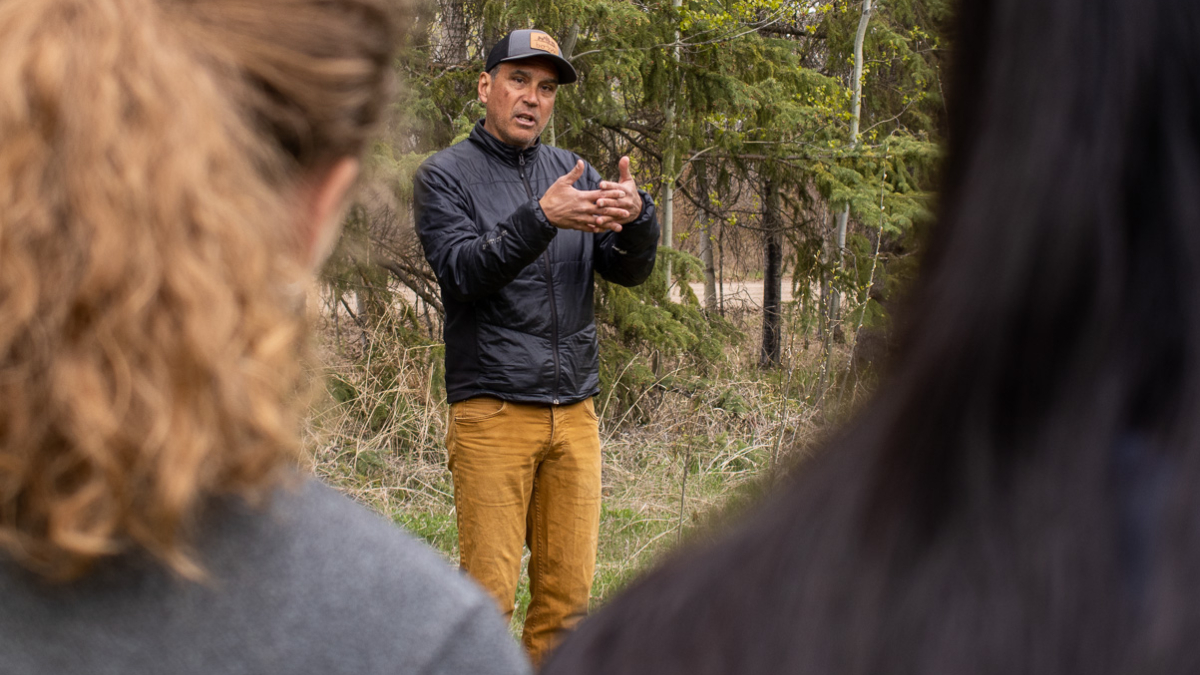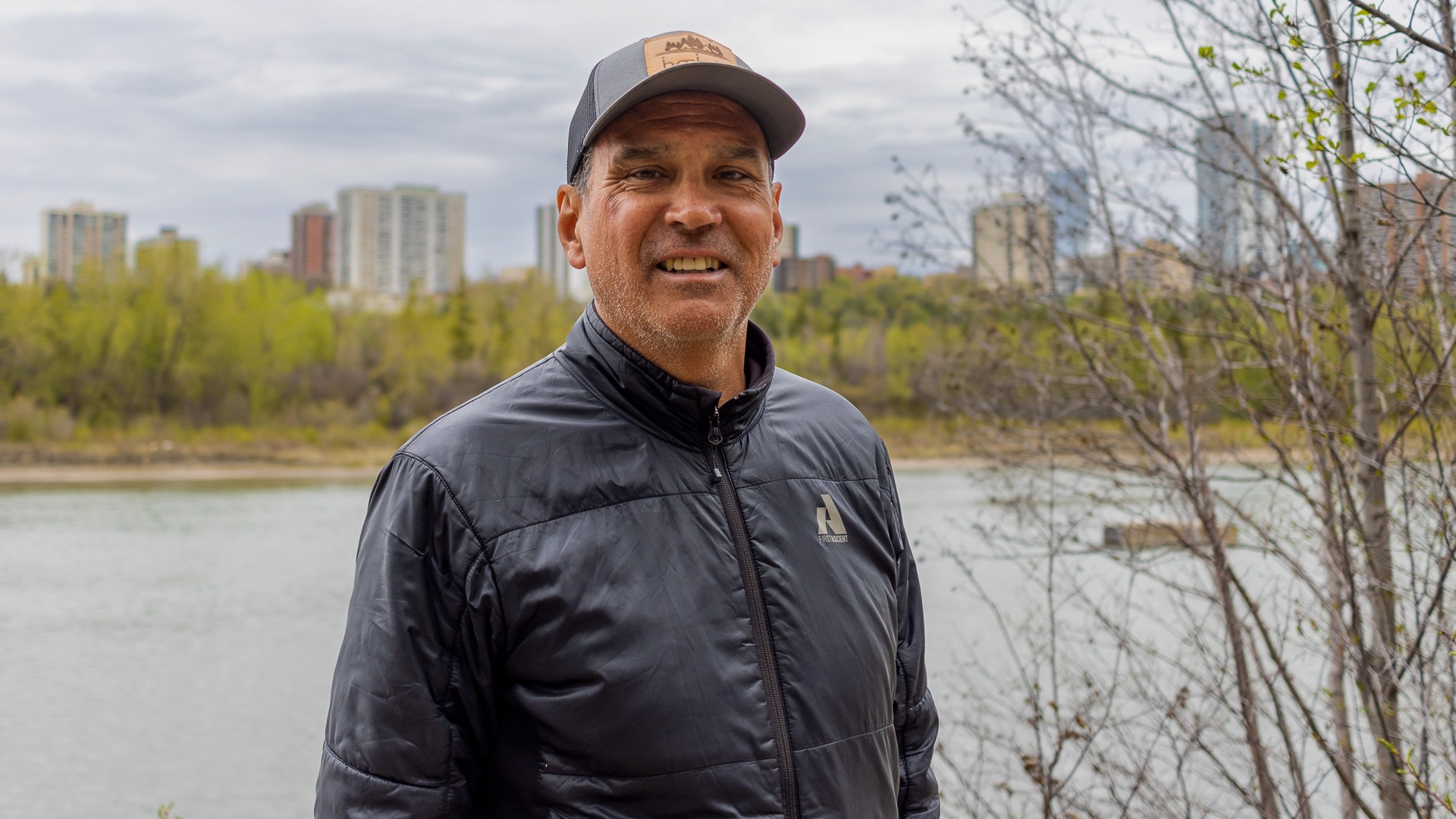There is a wisdom principle known as wâhkôhtowin underpinning how Cree peoples fundamentally see the world. Literally it means kinship but refers more widely to the interconnectedness of human beings with each other and with all other forms of life.
According to Dwayne Donald — freshly appointed Canada Research Chair in reimagining teacher education with Indigenous wisdom traditions — wâhkôhtowin is a wisdom teaching sorely lacking in Canada’s education system, and one that may be necessary for our very survival.
Donald, a professor in the Department of Secondary Education, is one of nine University of Alberta researchers named as new Canada Research Chairs today.
According to Donald, the Age of Enlightenment informing western colonialism— based on reason, individualism and skepticism — took an unfortunate “epistemological turn” that disregarded the metaphysical qualities of human life, along with the sacred nature of ecological relationships that human beings depend upon for their survival.
That epistemological turn is at least partly responsible for the destructive colonial logic that has wreaked so much havoc among Indigenous peoples, he says, seeing anything beyond the privileged individual as objects to either conquer or exploit.
Indigenous wisdom traditions never made that turn. For the Cree, or nêhiyawak peoples, wâhkôhtowin is profoundly rooted in place: “When we connect with local ecosystems we tap into the wisdom of the wâhkôhtowin imagination,” says Donald.
“We are taught to approach places as living relatives. It has to do with how to live a good life in a way that does the least damage, so that all life can continue on.”

In pedagogical terms, it’s not a question of simply removing information from curriculum no longer considered relevant and replacing it with factual elements of Indigenous knowledge.
“That’s another legacy of colonial logic, when knowledge and knowing is taken up mostly in informational ways,” Donald says. “You can't approach Indigenous knowledge with a PowerPoint presentation, because there is no shift in how the information is engaged by the person receiving it.”
“If we really want to make a change, we can't continue to follow the same educational paradigms. It has to do with relationality. Of course, humans are cognitive beings, but meaningful learning also has to do with the holistic complexities of human perception of the world — physically, emotionally and spiritually.”
Life-changing perspective shift
Donald came to this revelation relatively late in life. His mixed ancestry includes Beaver Hills Cree, Métis, Norwegian and Scottish. But in his youth growing up in Edmonton, he was exposed to little of his Indigenous heritage.
“I didn't learn much about it. Times were different then, and I understand that,” he says. “I don't blame anybody for it.”
After graduating with a BA from the U of A and a BEd from the University of Calgary, he got his first job as a social studies teacher at Kainai Nation, a Blackfoot community in southern Alberta.
“My Blackfoot friends took pity on me over 10 years and taught me about their land and shared their stories, and I got to participate in ceremonies. Those experiences changed my life,” he says.
For the past two decades, starting with his doctoral work in 2003, that shift in perspective has informed everything he does.
“It has been my goal to connect with the wisdom and the gifts that exist in the place that I'm from, amiskwaciy, and let that guide me in my role as an educator,” he says.
In his role as CRC, he plans to introduce locally rooted concepts of Indigenous wisdom to teachers in four communities across Canada. The project will be aimed at “unlearning colonialism and the educational legacies of relationship denial,” Donald says.
“I want to ask teachers to help me puzzle on this issue, and reflect upon their own experiences with it as students and as educators, and experiment with how we can proceed differently.”
New Canada Research Chairs at U of A
Donald is one of four U of A researchers appointed as Tier 1 CRCs, worth $1.4 million over seven years.
Mechanical engineering professor Tian Tang was named Tier 1 CRC in Multi-scale Modeling of Soft Materials and Interfaces. She develops models, methods and tools that allow for multi-scale characterization of natural and synthetic soft materials with applications in nanotechnology, biomedical engineering, energy and environment.
A professor of critical care medicine, Sean Bagshaw, was named Tier 1 CRC in Critical Care Outcomes and Systems Evaluation. His research program aims to identify and characterize inequities, evidence-to-care gaps and system inefficiencies in critical care, so it can best respond to evolving trends in critical illness and facilitate adoption of innovations and new evidence.
Michael J. Hendzel in the Department of Cell Biology was named Tier 1 CRC in Genome Cell Biology and Dynamics. His research involves understanding the relationship between DNA organization and reorganization within the interphase nucleus and the functional regulation of the DNA. The project has a particular focus on how and why DNA is found in the form of a gel within our cells, the regulation of which may be important for controlling access to the instruction set as well as the structural integrity of our cells.
Five U of A researchers were appointed Tier 2 Canada Research Chairs, worth $500,000 over five years, with an additional stipend of $20,000 per year for first-term chairs.
As Tier 2 CRC in Transgender Creativity and Mental Health, Augustana Campus English professor Lucas Crawford will query the role of “madness” in the literary and psychiatric histories of transgender. He will look to trans artists and writers as wellness experts in their own right — as practitioners versed in imagination, collaboration and queer emotion.
Jason Plemel was appointed Tier 2 CRC in Glial Neuroimmunology. His research examines immunity in the central nervous system as it relates to multiple sclerosis, focusing on the CNS-resident immune cell, called microglia, as the primary immune cells of the CNS.
Andrew Pepper was named Tier 2 CRC in Cell Therapies for Diabetes. His research program examines the underlying mechanisms governing pancreatic beta cell survival and function, with the ultimate goal of developing and refining beta-cell replacement therapies that could become a universal treatment for a broader range of people living with Type 1 diabetes.
Gopinath Sutendra is the new Tier 2 CRC in Cardio-oncology and Molecular Medicine. He will explore chemotherapy-induced cardiotoxicity (CIC), an emerging clinical problem whereby commonly used cancer therapies cause heart failure. Sutendra’s program aims to discover new mechanisms and therapeutic targets to prevent CIC and other forms of heart failure while enhancing chemotherapy-mediated tumour regression.
A professor in the Department of Physiology, Maria Ioannou has been named Tier 2 CRC in Brain Lipid Cell Biology. Her research is focused on understanding the cellular mechanisms of lipid transport in the brain and how this process is affected in multiple neuropathologies.
